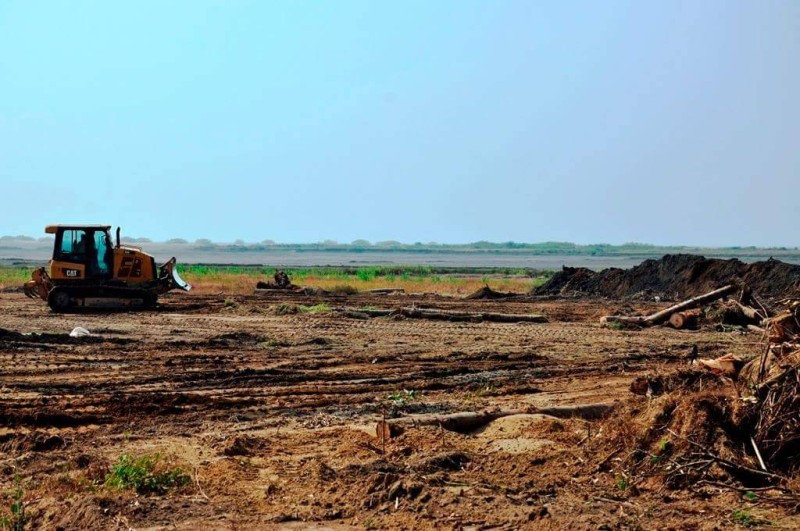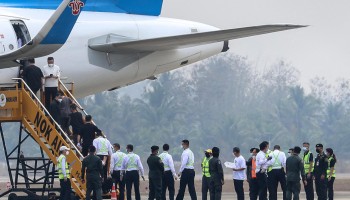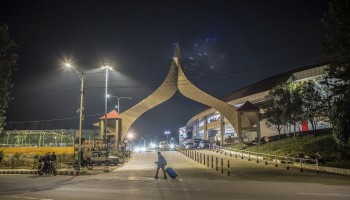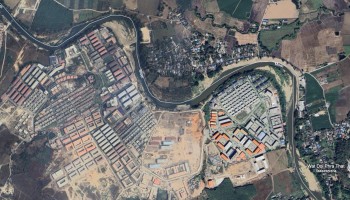Reported by
Myanmar companies received state contracts to build police posts and other infrastructure on land seized from Rohingya Muslims, who fled their homes amid violent “clearance operations” by security forces, United Nations investigators said in a report today.
More than 700,000 Rohingya fled to Bangladesh in 2017 from western Myanmar — where they are an ethnic and religious minority in the mostly-Buddhist country — when security forces responded to insurgent attacks by targeting civilians.
In the wake of the mass exodus, the military-dominated government handed out contracts to at least nine companies to clear and develop land in Rohingya communities, according to a report by the U.N.’s Independent Investigative Mechanism for Myanmar (IIMM).
Among those firms was Asia World Company, one of Myanmar’s largest conglomerates with operations that include running the country’s main port in the commercial capital of Yangon.
“Rohingya villages were destroyed by the Myanmar military during the 2017 clearance operations, demolished and razed, and replaced with Border Guard Police Battalion bases,” the IIMM said.
“Asia World Company carried out the physical construction of bases, roads, and security outposts that entrenched this territorial control,” according to the report.
Asia World did not respond to requests for comment, nor did military authorities who have taken over the Myanmar government.
Run by Tun Myint Naing — also known as Steven Law — Asia World has a long history of working with Myanmar’s military, which became notorious over decades for imprisoning political activists and committing atrocities against civilians in conflict areas.
“There needs to be an international criminal investigation into Asia World and all other crony companies that have aided and abetted the Myanmar military’s international crimes,” Yadanar Maung, a spokesperson for activist group Justice For Myanmar, told OCCRP.
In 2010, the U.S. sanctioned Tun Myint Naing and Asia World, along with scores of other people and firms, for supporting the military junta.
The junta had granted Asia World “numerous lucrative government concessions, including the construction of ports, highways and government facilities,” the U.S. Treasury Department said at the time. Treasury also accused Tun Myint Naing’s father, who founded Asia World in 1992, of being “one of the world's key heroin traffickers dating back to the early 1970s.”
In 2016, the U.S. government issued a sweeping order to lift most sanctions on Myanmar in response to democratic reforms that began in 2011, including holding parliamentary elections. Rights groups criticized the move, however, with dozens signing an open letter in late 2017 urging the U.S. to reimpose sanctions amid “accounts of unfathomable brutality” against the Rohingya.
The attacks on Rohingya civilians “likely constitute crimes against humanity and genocide,” the U.N. rapporteur on human rights in Myanmar has said.
In its new report, the IIMM said the redevelopment of Rohingya “farms, homes, businesses and land” by state security forces and private companies could amount to evidence that authorities “intended to destroy the group.”
“By paving over sacred and communal spaces, the authorities obliterated material proof of Rohingya history, making future claims of belonging or return more difficult,” the report said.
Myanmar’s decade-long experiment with democracy ended on February 1, 2021, when the military seized complete control of the government and jailed elected leaders. Since then, at least 6,092 civilians have been killed, 28,051 have been arrested, and more than 3.5 million people have been displaced amid armed resistance to the military, according to a 2024 U.N. report.
Justice For Myanmar’s spokesperson said governments around the world need to “step up and impose targeted sanctions on the military junta and its businesses.”
“The Myanmar military is continuing to commit war crimes and crimes against humanity, and this campaign of terror is sustained by a network of businesses that supply it with the resources it needs to carry out daily indiscriminate airstrikes and shelling, arbitrary arrests and torture,” said Yadanar Maung.





